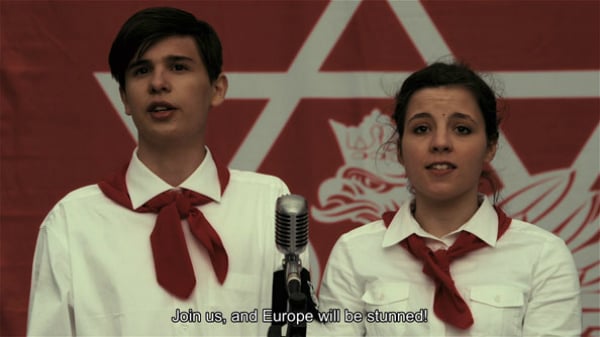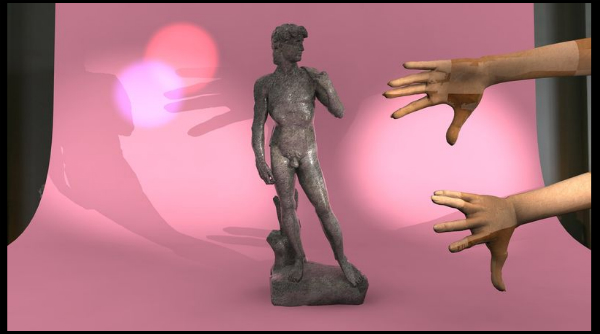Art & Exhibitions
Israel and Germany Mark 50 Years of Diplomatic Ties with Exchange of Masters and Political Art in Defiance of Boycott
Even the work of boycott supporters will make it to Tel Aviv.

Even the work of boycott supporters will make it to Tel Aviv.

Hili Perlson

Up to the mid-1950s, Israeli passports bore the stamp “Valid to any country except Germany,” and Israel refused to enter into diplomatic relations with the post-Nazi country until 1965. This year marks the 50th anniversary of the landmark date, an occasion which is celebrated with a slew of exchanges, not least in the arts and culture sector.
The most prominent exhibitions taking place under this umbrella are held in Tel Aviv and Berlin. “The Century Mark. Tel Aviv Museum of Art visits Berlin,” which opens tonight, brings some 72 works from the Israeli museum’s collection to Berlin’s Martin-Gropius-Bau, including artworks by Marc Chagall, Wassily Kandinsky, Jackson Pollock, Mark Rothko, and Alberto Giacometti.
But it’s the works by a younger generation of contemporary artists that are bound to engross viewers. Video installations, paintings, and photographs by artists such as Yael Bartana, Guy Ben-Ner, Zoya Cherkassky, Raafat Hattab, Michal Helfman, and Nira Pereg among others, are set to offer a varied and nuanced–not to mention critical–engagement with the political and social conditions in Israel. All ask: What does it mean to be making art in a place where, whether you like it or not, all forms of cultural production have become political? Is all art therefore political art?
Critical Positions not Shunned
Judging from the list of participating artists, the show’s curators Suzanne Landau, Ellen Ginton, Irith Hadar, and Raz Samira didn’t shy away from “uncomfortable” positions—and this despite growing calls for the cultural boycott of Israel.
But then again, ideological white-washing, especially in official state-funded events, is not something the country can afford (see The Cultural Boycott of Israel Isn’t Solidarity, It’s Condescension and Artists for Palestine UK Respond to JJ Charlesworth’s Criticism of the Cultural Boycott of Israel).

Yael Bartana, still from …And Europe Will Be Stunned (2007-2011)
Photo: courtesy Art Gallery of Ontario
Yael Bartana, for example–whose film trilogy for the Polish Pavilion at the 2011 Venice Biennale called for a return of Polish Jews from Israel to Poland–was also outspoken in the call for the rejection of Israeli sponsoring of the São Paulo Biennial (see Artists Call on Biennial de São Paulo to Reject Israeli Funds).
Julia Stoschek Collection Brings Time-Based Art to Tel Aviv
While parts of its collection are on display in Berlin, the Tel Aviv Museum is playing host to new-media and time-based artworks from the Düsseldorf-based Julia Stoschek Collection in a show titled “Turn on,” which opens on March 30. Video works by Marina Abramović, Christoph Schlingensief, Klara Lidén, and Adrian Paci explore the performative and theatrical means of the medium.
The list also features names that one didn’t expect to see associated with Israel anytime soon: namely Ed Atkins and Helen Marten. Both British artists are signatories of the AFP’s pledge for cultural boycott, which calls for rejecting invitations to participate in Israeli state-funded exhibitions (see Jeremy Deller, Ed Atkins, and Hundreds of UK Artists Support Cultural Boycott of Israel).
In an email correspondence between Atkins and Stoschek, shared with artnet News by the Stoschek Collection, Ed Atkins pointed out that once his work entered her collection, the decision to show it lies with the collector: “My decision to sign the petition was made last year at the height of the conflict. It is entirely my decision and isn’t something that should affect your decisions or your sense of how or where you want to show your collection.”

In her statement to artnet News, Stoschek shared her views on the boycott, “Letting art that has originated in free spirit take place, is one of the most important tasks in the promotion of tolerance. We are proud to be able to show the largest ever exhibition of time-based media art in Israel.”
With Israeli artists flocking to Berlin in recent years to enjoy the city’s affordable living and thriving art scene, the cultural exchange between Israel and Germany is perhaps not in urgent need of bolstering. Nevertheless, the exchange offers a unique opportunity to approach the complexities informing the current political situation from a wider perspective, and somewhat alleviate the increasing cultural insularity in Israel.
“The Century Mark. Tel Aviv Museum of Art visits Berlin,” is on view at Martin-Gropius-Bau, Berlin from March 27 through June 21, 2015.
“Turn On. Time-Based Art from the Julia Stoschek Collection” is on view at the Tal Aviv Museum of Art from March 30 through August 29, 2015.